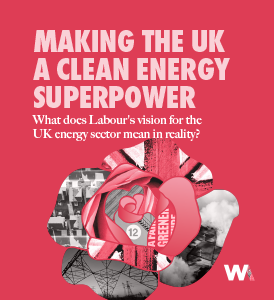
Making the UK a clean energy superpower: What does Labour's vision for the UK energy sector mean in reality?
With Labour consistently ahead in the polls for 18 months, all businesses should prepare for the party to win power at the next General Election, most likely to be autumn 2024.
As the election – and the significant likelihood of governing – draws closer, the party has begun to set out to voters and industry what a Labour Government would mean for the UK’s energy future.
Energy policy is and will continue to be a huge focus for an incoming Labour Government. Major challenges are to be met around inflation, energy security and Net Zero. Labour have clearly spotted an opportunity to create an edge.
The polling and media analysis we publish in this report shows that energy issues have been more prominent over the past 18 months compared to the previous decade,and that the public are more aware than ever of where their energy comes from and how much it costs.
Our polling also shows that support for net zero, and the need for renewables as a clean and good-value means of meeting it, is particularly high.
Most soundbites about energy from Labour and the Conservatives involve similar targets and ambitions, but Labour have more aggressive timelines. While politicians may seek to highlight dividing lines, fundamentally providing a plentiful supply of clean, affordable and secure power isn’t a contentious issue, and has broad cross-party support.
The key political difference comes in the pace and scale of delivery, and credibility when it comes to implementation.
Labour’s 2030 zero carbon electricity commitment has raised eyebrows from an industry and commentariat already sceptical about the Government’s less ambitious 2035 target.
The challenge for Labour is to prove they can deliver on it, and this will require tectonic reforms.
A Labour government would have to overhaul the planning system, give new mandates to multiple regulators from Ofgem to the environment agency, rethink transmission management and incentivise developers to keep up the pace needed to decarbonise electricity by 2030.
Energy interests should not be deterred by Labour’s complex structures and lengthy policymaking processes. Ahead of Party Conference in October, and as it draws together its manifesto, Labour is in listening mode.
In this energy sector report, we assess Labour’s policies, and some of the challenges the party will face in delivering them, drawing on extensive conversations we’ve had with Labour decision-makers and those close to the party’s thinking, our own in-house media analysis, and bespoke poling on how voters and MPs see crucial energy questions. We also give insight into the people, groups and processes that sit behind Labour’s energy policy-making, and provide recommendations about how to engage with Labour to ensure your voice is heard.
You’ll find our report comprehensive, but please get in touch with Angus Hill by email – angushill@wacomms.co.uk or on 07736 889848 if you would like further information or a presentation on how WA Communications can help you.
Our analysis of the Labour Party’s energy sector thinking draws Next Left – WA’s recently published Guide to Engaging with the Labour Party – which explores the people, processes and politics shaping the development of Labour’s next election manifesto, and how businesses in every sector can engage with the party’s plans.
